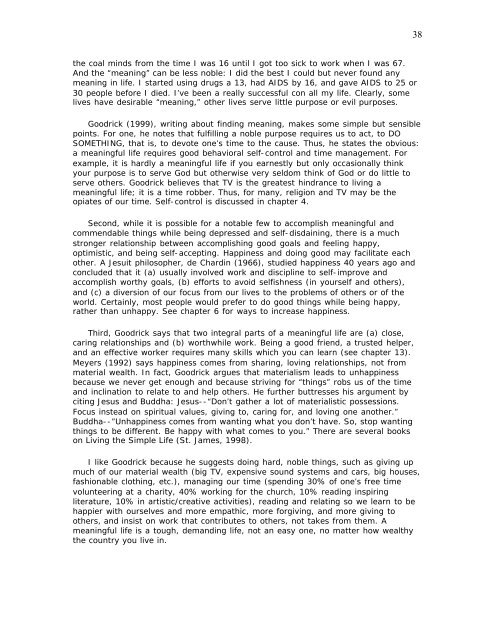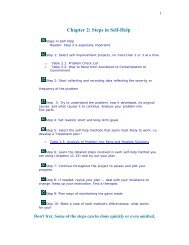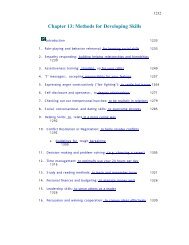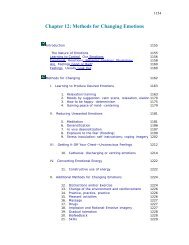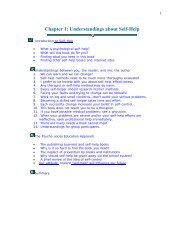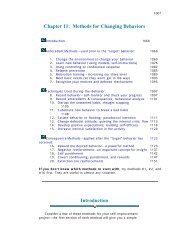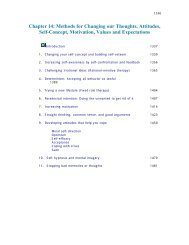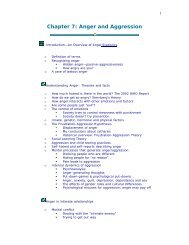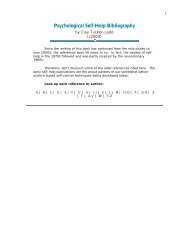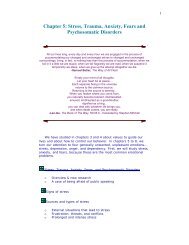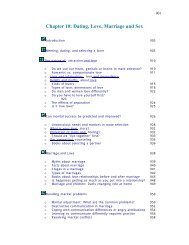Chapter 3: Values and Morals:Guidelines for living - Psychological ...
Chapter 3: Values and Morals:Guidelines for living - Psychological ...
Chapter 3: Values and Morals:Guidelines for living - Psychological ...
Create successful ePaper yourself
Turn your PDF publications into a flip-book with our unique Google optimized e-Paper software.
the coal minds from the time I was 16 until I got too sick to work when I was 67.<br />
And the “meaning” can be less noble: I did the best I could but never found any<br />
meaning in life. I started using drugs a 13, had AIDS by 16, <strong>and</strong> gave AIDS to 25 or<br />
30 people be<strong>for</strong>e I died. I’ve been a really successful con all my life. Clearly, some<br />
lives have desirable “meaning,” other lives serve little purpose or evil purposes.<br />
Goodrick (1999), writing about finding meaning, makes some simple but sensible<br />
points. For one, he notes that fulfilling a noble purpose requires us to act, to DO<br />
SOMETHING, that is, to devote one’s time to the cause. Thus, he states the obvious:<br />
a meaningful life requires good behavioral self-control <strong>and</strong> time management. For<br />
example, it is hardly a meaningful life if you earnestly but only occasionally think<br />
your purpose is to serve God but otherwise very seldom think of God or do little to<br />
serve others. Goodrick believes that TV is the greatest hindrance to <strong>living</strong> a<br />
meaningful life; it is a time robber. Thus, <strong>for</strong> many, religion <strong>and</strong> TV may be the<br />
opiates of our time. Self-control is discussed in chapter 4.<br />
Second, while it is possible <strong>for</strong> a notable few to accomplish meaningful <strong>and</strong><br />
commendable things while being depressed <strong>and</strong> self-disdaining, there is a much<br />
stronger relationship between accomplishing good goals <strong>and</strong> feeling happy,<br />
optimistic, <strong>and</strong> being self-accepting. Happiness <strong>and</strong> doing good may facilitate each<br />
other. A Jesuit philosopher, de Chardin (1966), studied happiness 40 years ago <strong>and</strong><br />
concluded that it (a) usually involved work <strong>and</strong> discipline to self-improve <strong>and</strong><br />
accomplish worthy goals, (b) ef<strong>for</strong>ts to avoid selfishness (in yourself <strong>and</strong> others),<br />
<strong>and</strong> (c) a diversion of our focus from our lives to the problems of others or of the<br />
world. Certainly, most people would prefer to do good things while being happy,<br />
rather than unhappy. See chapter 6 <strong>for</strong> ways to increase happiness.<br />
Third, Goodrick says that two integral parts of a meaningful life are (a) close,<br />
caring relationships <strong>and</strong> (b) worthwhile work. Being a good friend, a trusted helper,<br />
<strong>and</strong> an effective worker requires many skills which you can learn (see chapter 13).<br />
Meyers (1992) says happiness comes from sharing, loving relationships, not from<br />
material wealth. In fact, Goodrick argues that materialism leads to unhappiness<br />
because we never get enough <strong>and</strong> because striving <strong>for</strong> “things” robs us of the time<br />
<strong>and</strong> inclination to relate to <strong>and</strong> help others. He further buttresses his argument by<br />
citing Jesus <strong>and</strong> Buddha: Jesus--“Don’t gather a lot of materialistic possessions.<br />
Focus instead on spiritual values, giving to, caring <strong>for</strong>, <strong>and</strong> loving one another.”<br />
Buddha--”Unhappiness comes from wanting what you don’t have. So, stop wanting<br />
things to be different. Be happy with what comes to you.” There are several books<br />
on Living the Simple Life (St. James, 1998).<br />
I like Goodrick because he suggests doing hard, noble things, such as giving up<br />
much of our material wealth (big TV, expensive sound systems <strong>and</strong> cars, big houses,<br />
fashionable clothing, etc.), managing our time (spending 30% of one’s free time<br />
volunteering at a charity, 40% working <strong>for</strong> the church, 10% reading inspiring<br />
literature, 10% in artistic/creative activities), reading <strong>and</strong> relating so we learn to be<br />
happier with ourselves <strong>and</strong> more empathic, more <strong>for</strong>giving, <strong>and</strong> more giving to<br />
others, <strong>and</strong> insist on work that contributes to others, not takes from them. A<br />
meaningful life is a tough, dem<strong>and</strong>ing life, not an easy one, no matter how wealthy<br />
the country you live in.<br />
38


